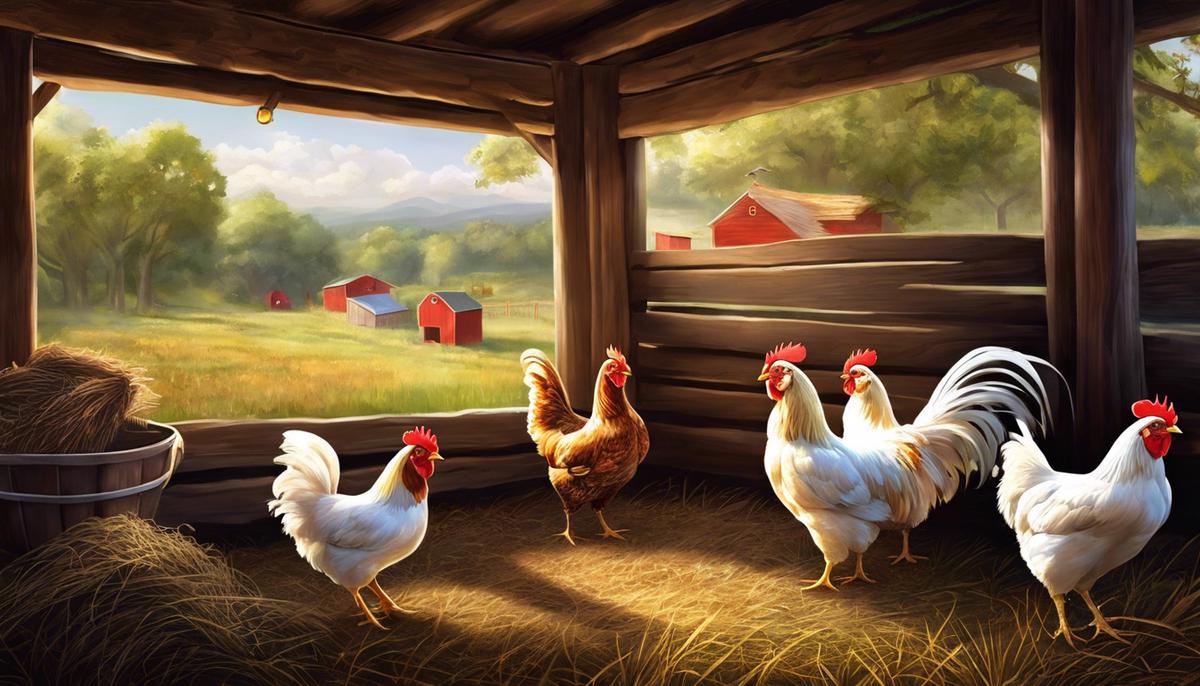

Agridisk
Egypt - Alexandria
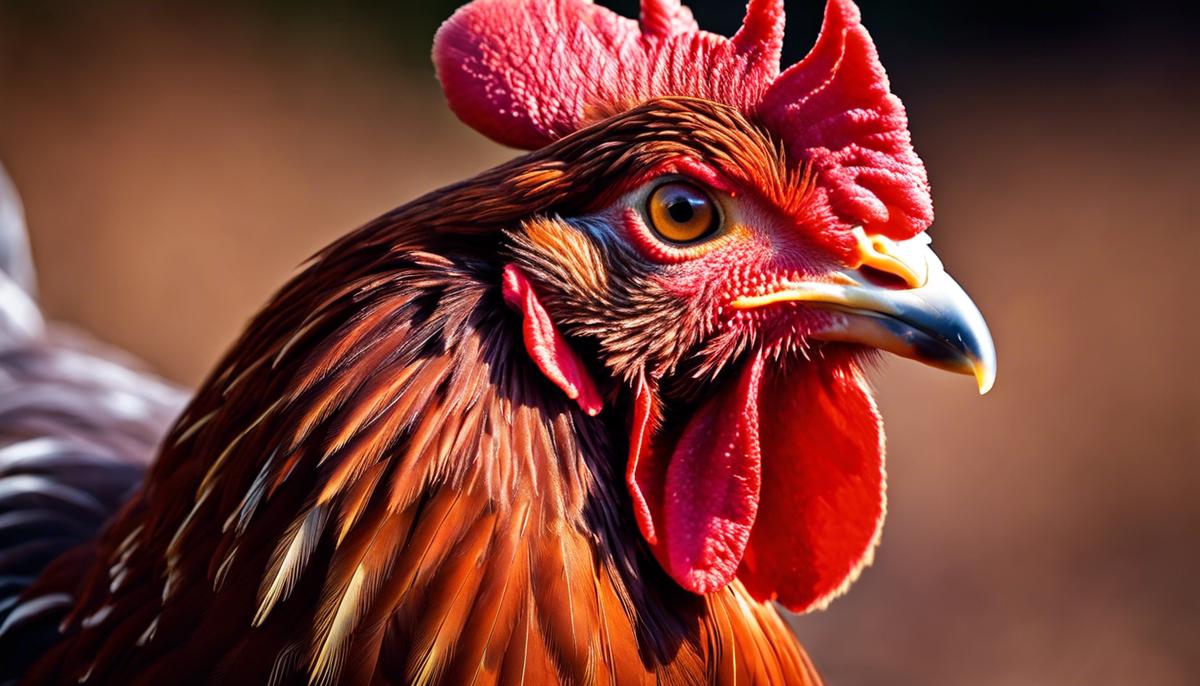
Best egg laying chickens for beginners | What are the easiest chickens to lay eggs with?
Description: Embarking on a journey into the world of backyard chicken keeping can be both exciting and overwhelming. With a vast variety of chickens to choose from, it's important for beginners to select breeds that offer ease of care, robust health, and reliable egg production. Three breeds stand out as ideal candidates for those taking their first steps into poultry husbandry: the resilient Rhode Island Red, the versatile Plymouth Rock, and the prolific Australorp. Each of these breeds brings unique qualities to the table, ensuring that newcomers not only enjoy a steady supply of fresh eggs but also form joyful and interactive relationships with their feathered friends. Let's explore why these chickens are celebrated as the top picks for beginners and what makes them so special. Nestled in the cozy corners of backyards and dotting the expanse of rural farms, Rhode Island Reds have clucked their way into the hearts of poultry enthusiasts far and wide. These rust-feathered wonders are often heralded as the quintessential choice for fledgling flock keepers, and it's easy to see why. When considering which breed to introduce into a new coop, the list of reasons to opt for a Rhode Island Red is as robust as the chickens themselves. One of the standout qualities of Rhode Island Reds is their hardiness. They possess a remarkable ability to adapt to both hot and cold climates, ensuring that whether the coop is under a blanket of snow or basking in the full blaze of summer, these birds remain unfazed and productive. Their dense feathers provide ample insulation, eliminating the excessive worry about their comfort and survivability through changing seasons. Looking forward to breakfast? Rhode Island Reds have got it covered. These ladies are prolific layers, producing a bountiful supply of large, brown eggs. It's not unusual for a single hen to deliver up to 250 to 300 eggs annually, making them a reliable source for anyone wanting to enjoy home-grown eggs or even make a modest income from their chicken-keeping efforts. Some chickens are flighty, while others can be downright ornery. Rhode Island Reds, however, are often celebrated for their friendly disposition. They forge a connection with their keepers, exhibit an inquisitive nature, and their relatively calm temperament makes them great companions for families with children as well as newcomers to the chicken-raising world looking for a less-intimidating introduction. No one enjoys the battle against mites, lice, or the myriad of other pests that can trouble a flock. Rhode Island Reds come equipped with an inherent resilience, fending off many common parasites and diseases better than some other breeds. This resilience not only gives their keepers peace of mind but also reduces the time and resources spent on health maintenance. Venture into any farm supply store or look through poultry catalogues and there's a high chance Rhode Island Reds will be prominently featured. Their popularity ensures that they're an accessible breed for those just starting. This ease of acquisition is not only convenient but can also provide a sense of community as fellow Rhode Island Red enthusiasts abound, offering a network of support and shared knowledge. Beginners will appreciate that these birds aren't divas of the coop world. They aren't demanding in terms of care and are satisfied with the basics – proper nutrition, clean water, a secure shelter, and space to roam. This makes them an ideal breed for those who may not have extensive experience in providing specialized care or elaborate housing for more sensitive breeds. All these factors together construct a vivid portrait of why Rhode Island Reds stand tall as the top pick for any new flock. Their robustness, prolific laying, amiable nature, and the ease with which they can be cared for, make them not just a feasible option, but an extremely rewarding one for any aspiring chicken keeper. They turn the dream of a backyard full of clucking contentment into a delightful reality, and in doing so, they secure their spot as the feathered favorites of beginners and seasoned chicken lovers alike. When the cluck calls and one seeks a feathered companion that effortlessly blends into any backyard brood, the search for just the right breed can lead through a myriad of choices. If you're on the lookout for a chicken that's not just friendly and dependable but has a few more charming traits to offer, you're in luck! Here's a nugget of wisdom to help you find the best fit for your coop. First up, think about the size of the chicken. If space is at a premium, bantam breeds could be a perfect match. Not only do these pint-sized poultry take up less room, but they also can be exceedingly affectionate, making them great choices for those with limited space without sacrificing the joys of chicken-keeping. The social hierarchy of a flock is key, and some breeds have proven to be great at integrating without ruffling too many feathers. Opt for a breed that's known to play well with others, reducing the pecking order drama and ensuring a harmonious habitat for all your hens. For those who value a touch of ornamental flair, certain breeds boast an array of colorful feathers that can turn any ordinary coop into a vibrant poultry parade. These birds prove that practicality doesn't have to come at the expense of pizzazz. Speaking of the coop, consider a breed with a reputation for being low on the escape-artist spectrum. There are chickens that take to their home like a duck to water, staying put when they're supposed to. This not only keeps your chickens safe but saves you the headache of frequent feathered-fugitive roundups. A chicken's diet can sometimes be a bit of a puzzle, but thankfully, there are breeds known for being not too fussy eaters, happy to peck away at a variety of foods without requiring a specialized menu. This can cut down on feed costs and simplify your life. Last but not least, longevity matters. It's worth seeking out a breed known for a longer lifespan, ensuring that your feathery friends will be part of the family for years to come without needing frequent replacements. At the end of the day, the perfect chicken breed is one that thrives under your care, making each day a delight for both keeper and kept. With these additional tips, may your coop be filled with clucks of contentment and baskets of fresh eggs! High Egg Quality and Taste Once your Australorp flock starts laying, be prepared for some of the highest quality eggs around. The eggs boast rich, deep yellow yolks thanks to their excellent diet conversion, and many backyard poultry enthusiasts rave about their superior taste compared to standard store-bought eggs. Whether they’re bound for a delicious breakfast scramble or the centerpiece in a batch of homemade pastries, these are the kinds of eggs that get noticed for all the right reasons. Brooding Tendencies for Sustainable Flocking Looking to increase your flock without constant chick orders? Australorps have a maternal edge, often showcasing brooding tendencies. This means they might just hatch and raise the next generation of layers right in your very coop. Their broodiness complements their egg-laying prowess, ensuring a self-replenishing feathered family that connects you to the circle of life in your backyard. Dual-Purpose Utility While famed for their egg-laying capabilities, it's worth mentioning that the Australorp is also a robust breed with a fair amount of meat on its bones. They can double as a meat source in addition to being prolific layers. This dual-purpose nature means they offer incredible value for those looking to maximize the utility of their poultry without specializing in just egg or meat production. Glossy Black Feathers Shimmer Like a Gem Australorps bring more than just their eggs to the table; they're also an absolutely gorgeous breed. Their black feathers have a unique, beetle-green sheen in the sunlight that can transform your coop into a shimmering spectacle. A flock of these birds strutting around the yard isn't just productive; it's also visually stunning and a definite conversation starter. Record-Breaking Ancestry Did you know that the Australorp has a place in the poultry record books? One impressive Aussie hen set a world record by laying 364 eggs in just 365 days. While this might not be the norm, it certainly suggests the egg-cellent laying potential within the breed's genetics. It's always fun to rear a breed known for making history, isn't it? Community and Support Networks Due to their popularity, there are vast communities and support networks centered around the Australorp breed. From online forums, breed clubs, to local poultry shows—there’s a wealth of knowledge and camaraderie available. Joining such groups can lead to invaluable tips for care, opportunities for swapping birds, and maybe even finding local Australorp experts. In summary, embracing the Australorp breed in your backyard coop means raising the bar on what you can expect from your feathered friends. It’s a choice that promises more than just a plentiful supply of eggs, but also a fulfilling journey in the company of some of the most delightful characters in the poultry world. Raising chickens in your backyard brings the joy of fresh eggs, the delight of watching birds' antics, and the satisfaction of sustainable living. The Rhode Island Red, Plymouth Rock, and Australorp breeds are exemplary choices that have proven their worth to beginners time and time again. Their combination of friendly natures, ease of care, and egg-laying prowess creates a fulfilling introduction to poultry keeping. There is a perfect chicken breed out there for every aspiring chicken keeper, and starting with these recommended breeds might just spark a lifelong passion for this rewarding hobby. So, grab your coop plans and your sense of adventure, because an unforgettable experience awaits with these feathered companions at your side. Raising chickens for egg production is a time-honored tradition, both a rewarding and productive venture that could very well transform your family’s everyday life. Imagine the delight of gathering your own fresh eggs, directly from your backyard, all while teaching children about nature's cycle and accountability. This piece provides you comprehensive knowledge on raising egg-laying chickens, elucidating the whole egg-laying process intricacies, recommending the most efficient chicken breeds, providing essential care tips, and outlining the associated benefits and challenges. Ultimately, this invaluable guide aims to make the rewarding experience of raising egg-laying chickens accessible and enjoyable to families everywhere. Howdy, friends! As a homemaker who's nurtured a fair share of clucking feathered divas in the backyard, decoding the mysterious egg-laying process of chickens has been an exciting journey. Whether embarking upon your backyard chicken journey or simply intrigued by the whole scenario, this is for you! Now imagine this, a hen's egg-laying journey begins before she even pops into existence. Astonishing, isn't it? It all begins in the embryo stage, when her entire life's stockpile of egg cells start forming. Egg-laying marvelously reveals nature's design programmed for survival and continuity. It generally commences when a chicken is about 4 to 5 months old, spurred by hormonal changes as they mature. It's pretty fascinating, akin to the onset of human adolescence. Did you know that hens are most productive during their first two years, laying almost an egg a day? How's that for being busy birds! What adds a touch of wonderment is the overall egg formation activity. A hen’s body, particularly her reproductive system, is marvellously equipped to create and deliver these delicate packages. Once an egg is fertilized, the yolk travels down a tube in the hen's body called the oviduct. Here layers of albumen, or egg white, and protective membranes enclose it. Astoundingly, this part of the process takes a mere 3 hours! Next, our developing egg moves onto the shell gland region known as the uterus. Over the next 20 or so hours, this is where the egg gets its hard outer shell. The icing on the cake is the amazing fact that it's during this stage that eggs acquire their characteristic oval shape. And voila! The hen lays the egg and the awe-inspiring 24-hour egg-laying cycle starts anew. Did you ever wonder why some chickens lay brown eggs and others lay white ones? This nifty little trick depends on the breed of the chicken. This journey unravels an exceptional dance of biology that takes place every day in the lives of our backyard feathered friends. So next time you collect their eggs, take a moment to marvel at this extraordinary process, a true testament to nature's astonishing complexity. And remember, a happy hen is a productive hen, so shower your clucking divas with plenty of care, good nutrition, and a safe, comfortable nesting environment. We sure feel lucky to have our hens, how about you? Understanding the intricacies of egg production in chickens, from hormonal changes to shell formation, can be a fascinating process. Equally captivating is figuring out which breeds can produce the most eggs. For those looking to enjoy fresh eggs daily, here's a rundown of the most common chickens breeds that are well-known for their egg-laying abilities. While every chicken is unique and might lay more or less than the average, the breeds above have proven to be reliable layers. Keep in mind that providing a balanced diet, plenty of fresh water, and an environment where they're comfortable will ensure your hens' health, happiness, and egg production. Embrace the joy of tending these fascinating creatures and savor the satisfaction of collecting freshly laying eggs right from your own backyard. It's a pastime that, for sure, is more than just clucking good fun! Proper Care for Happy, Egg-laying Chickens Realizing how amazing these creatures are, and the intricate process involved in laying those breakfast gems, isn't it evident that much care is needed to keep chickens happy and healthy? Let's delve into the various aspects requiring attention when raising egg-laying chickens in a backyard. An environment that's comfortable, clean, and secure goes a long way towards keeping hens happy and productive. Coops should be amply spacious, with at least 4-5 square feet per bird, to avoid overcrowding-induced stress. Cleanliness maintains healthy conditions, so frequent change of bedding and regular disinfection are crucial. Security-wise, the coop should be predator-proof, with locking doors and good ventilation. Nutrition is the cornerstone for chicken health and egg production. Layer feed should be the main dish in their diet, containing all essential nutrients. Approximately, 90-95% of their dietary intake should be layer feed. Supplementing their diet with high-calcium oyster shell supplements helps in strong shell development. However, kitchen scraps and garden pests only complement their diet and should not exceed 10% of their food intake. Keeping chickens hydrated and cool, especially during warmer months, is paramount. Ensuring access to fresh and clean water at all times, occasionally given chilled to decrease body temperature, is a must. Shade and misting systems can greatly help them beat the heat. Regular health checks can't be overemphasized. Checking for parasites, especially in their feathers and around the vent, is important. Regular worming, prompt care for any visible injuries, and checks for respiratory and digestive issues are essential. An annual veterinary visit will also assist in assuring flock health. Keeping a varied flock can have its benefits. When it comes to egg-laying, different breeds provide different egg colors and laying patterns. For a colorful egg basket, why not mix it up a little? Rhode Island Reds, leghorns, Sussex, Hy-Line Browns, Plymouth Rocks, Golden Comets, and Ameraucanas all have unique traits and egg colors, providing diversity both visually and nutritionally. Despite hens being social creatures, they also need space to retreat and lay their eggs. Nesting boxes should be private, dark, and comfortable. A 1:4 ratio of nesting boxes to hens is recommended. Fresh straw and frequent cleaning will keep the nests inviting and hygiene levels high. Last but not least, social interaction needs to be considered. Chickens enjoy interaction, both with their keepers and amongst themselves. They love routine and quickly become familiar with feeding schedules and treats. Spend time with the flock, it not only aids their mental well-being but also helps to familiarize them with human interaction. In conclusion, taking proper care of egg-laying chickens ensures they not only stay healthy and productive but also lead content, happy lives. From providing them with proper nutrition and comfort, to putting in measures for their health and social needs, the efforts made to care for them undoubtedly serve to enrich the experience of being a chicken parent. Ever wondered about the benefits and challenges of raising chickens for eggs? In the previous sections, we've unpacked intricate details about the egg-laying process, the best breeds for egg production, and essential care tips for chickens. Let's now move on to looking at the practical side of things - the advantages you can enjoy by raising these fascinating creatures and the hurdles you could encounter in the process! So why raise chickens for eggs? Besides the obvious benefit of fresh eggs, raising chickens can have other upsides. Let's take a look. Stress Relief: The wonder of egg collection every day, coupled with the tranquil clucking of chickens, can act as a therapeutic stress reliever. Laying hens add a lively charm to households! While these benefits make a compelling case to house a flock at the backyard, it's important to know the other side of the coin- the challenges. Raising chickens for eggs is a rewarding venture that yields bountiful benefits. Yet, the responsibilities attached to it require commitment. But as many chicken raisers will attest, once those first few eggs are collected, the challenges become part and parcel of a joyous journey towards sustainable living and a closer connection to nature. The clucking and pecking become music to ears, their quirky antics a source of amusement and the freshly laid eggs, an embodiment of delight and achievement. This backyard endeavor is truly a feather in the cap of homesteading! Embracing chicken raising for egg production is indeed a significant commitment, yet one that offers definite rewards. It connects families to nature, promotes responsibility among children, and provides a sustainable source of fresh, nutritious eggs. Understanding the egg-laying process, selecting the right chicken breed, and providing appropriate care are all crucial steps towards a successful venture. Though it carries its own set of challenges, the joy of watching your chickens thrive and appreciating their egg-laying abilities indeed outweighs any potential difficulties, making this a worthwhile endeavor for families. Get ready to embark on this interesting journey and garner the pleasure of fresh egg collection right from your backyard. In our quest to enjoy a more sustainable lifestyle, many have turned to raising hens not only for the benefit of fresh eggs but for the sheer joy of housing these friendly creatures. Chicken breeds vary greatly, with some offering exceptional egg-laying capabilities and others noted for their friendly demeanor. In this comparison of popular chicken breeds like the Orpington, Australorp, and others, we dive into the unique characteristics that make each breed special, focusing specifically on their egg-laying abilities and sociability. Further, we critically analyze various indicators that help identify a truly friendly chicken, helping enthusiasts make definitive and informed choices. Venturing into the realm of backyard chicken keeping is more than just a hobby; it's a delightful exploration into the world of feathery friends that offer gifts of fresh eggs in return for care and companionship. Undeniably, choosing the right breed that balances sociability and productivity makes the journey even more rewarding. So, don't just wing it! Let’s take a cluck around 3 top chicken breeds known for their friendly temperament and prolific egg-laying prowess. The Reliable Rhodes First off, meet the Rhode Island Reds—a classic American favorite dating back to the early 19th century. Boasting a shiny, deep mahogany coat, these sturdy chickens are well-renowned for their ruggedness and adaptability to various climates. But wait, there's more! Rhodes are social butterflies, typically friendly and easy to handle which makes them a hit among backyard chicken keepers. Plus, they're egg-laying superstars, typically churning out a whopping 200 to 300 large, brown eggs per year. All these traits make Rhode Island Reds an all-around solid breed to consider for novice chicken keepers. The Loveable Leghorns Then there are the lively Leghorns. Don’t be fooled by their small size; these Italian natives are true egg-laying machines. A single Leghorn can lay an impressive 280 to 320 white eggs annually. That’s nearly an egg a day! In addition to their stellar productivity, Leghorns are active and hardy birds, capable of foraging. Despite being slightly shy and independent, they can be tamed with adequate socialization—making them a delightful addition to any coop! The Friendly Fowls, Plymouth Rocks When it comes to the friendly fowls, the Plymouth Rock breed—or simply "Rocks"—rule the roost. With feather patterns ranging from barred, white to buff, these large, dual-purpose birds are not only charming but also pleasantly sociable and easy-going. They casually strut around the coop, making gentle clucks—a sight that can liven up any backyard! On top of that, Rocks are prolific layers, rewarding keepers with around 200 brown, medium-sized eggs each year—a treat that never gets old! And there we have it! Rhode Island Reds, Leghorns, and Plymouth Rocks are crowd favorites for their steadfast egg-laying abilities and overall friendly demeanor. Each breed brings its unique flair and charm to the flock, offering not just bountiful eggs, but hours of serene backyard entertainment and companionship. Get ready to nestle into an egg-citing chapter of your chicken rearing adventure! After all, happy hens lay the best eggs. Behind the feathery attributes of many chicken breeds hides a host of different personalities. Across the realm of chicken rearing, an understanding of behavioral traits is crucial. Their behavior draws an insightful line distinguishing a pet-like, friendly companion from a significantly less sociable type. How are traits affecting your chickens' temperament? Behavioral traits of chickens, much like those in humans, heavily impact their social demeanors. These traits range from how a chicken interacts with fellow poultry, to its response to human interaction, and even their eating habits. Imbibing few selected behaviors from the early stages can shape friendly, agreeable pets. On the contrary, chickens that have not been accustomed to human interaction may exhibit aggressive or skittish behavior. General behavioral traits in chickens can be classed into two categories: inherent (genetic) and learned traits. Learned traits are adopted based on the chicken's environment and experiences. For example, chickens that grow up around humans tend to be friendlier compared to those raised with minimal human contact. Genetic traits, however, are rooted in their DNA, passed down from generation to generation. So, if you're looking for a friendly breed of chicken, be sure to do your research about their lineage and behavior. Identifying positive and negative signs in chicken behavior Knowing what friendly and hostile signs to look out for in chicken behavior can save you from quite a bit of scratching and pecking. Friendly chickens will move towards you, peck lightly at your shoes or clothing, and won't mind being handled. These are all positive signs of sociability. On the flip side, aggressive signs include biting rather than pecking lightly, keeping their distance, or even raising their feathers when approached – a tactic used to appear larger and more intimidating. These behaviors might suggest that the chicken is uncomfortable with human interaction, something you might want to fix with gentler handling and positive reinforcement. So how can we foster more friendliness in our feathery friends? Associate positive interaction with snacks they love, like mealworms or fresh veggies. Spend time with them regularly, talk to them, pick them up, and pet them, so the birds will associate your presence with comfort and safety. Remember, there's more to keeping chickens than just delicious, fresh eggs. You're carving a path to a complex, rewarding relationship. These beautiful birds can surprise you with their unique personifications, charming quirks, and a spectrum of friendliness awaiting discovery. Keep these insights on chicken behavioral traits in your arsenal, and embrace the chicken-keeping journey with fun and fulfillment. For those considering embarking on this rewarding journey, arm yourselves with know-how and knowledge. The world of backyard chicken keeping is ready to welcome you with open wings. Happy Chicken Keeping! Conducive coops make a world of difference The coop is the chickens' world – its comfort directly affects their temperament. A crowded or dirty coop causes stress, affecting both egg productivity and sociability. Ensure your coop has adequate lighting, ventilation, and of course space. Follow the golden rule: a minimum of 2 square feet per mature chicken inside and 8 square feet outside. Offering a tailoring diet Nutrition plays a role not just in egg productivity but also in temperament. A healthy, well-nourished chicken is far more likely to be friendly and docile. Ensure you're selecting a balanced chicken feed, with protein, calcium, vitamins, and grains. The occasional high protein treat, like mealworms or kitchen leftovers, can boost egg production and overall chicken health. Treat them as pets, not just food Interaction with your chickens plays a significant role in their disposition. Regular, gentle handling from a young age gets them used to being around humans. The more time spent enacting in positive interactions, the friendlier they're likely to become. The key here is a calm demeanor and slow actions – chickens can be skittish, and too much excitement can be stressful for them. Playing the pecking order Chickens pretty much live by their flock hierarchy, or the “pecking order.” New chickens introduced to an established flock can stir up stress for all parties. Introductions should be slow and cautious. Remember, stressed chickens may cause pecking problems and can significantly affect egg production. Nurturing through noise Chickens, like many animals, respond well to calm, gentle noise. Consider playing soft music to soothe your feathered friends. Some chicken keepers swear by the calming effect of music on their flock which helps in reducing stress, therefore contributing to a friendly demeanor. Taking the time to understand their "clucks." Finally, a chicken's behavior can tell you a lot about what it needs or how it feels. For instance, constant squawking may indicate distress or discomfort. Understanding your chickens' vocalizations can help you to create a more comfortable environment and establish a friendly relationship. Raising prolific egg-laying and friendly chickens isn't a puzzle. It is a game of understanding their needs, offering them comfort, and treating them as pets with unique personalities. Get ready to break into a fascinating world of clucking and eggs-a-plenty! Enjoy a hobby that rewards you with a reliable source of fresh eggs and a lively backyard full of happy, friendly cluckers! As we've observed, raising happy and friendly laying hens is not just about choosing the right breed; it also requires thoughtful care taking into account factors that impact both sociability and productivity. With the practical tips and strategies outlined here, one is equipped to create an ideal environment for their chickens, that fosters sociability and maximizes egg production. Keep in mind the behavioral traits that mark friendliness and strive to cultivate them as your hens mature, aiming to foster a mutually beneficial bond of respect and comfort with your feathered friends. Remember, the key to having a coop of healthy and contented chickens lies not just in understanding their unique needs, but also in providing them with consistent care, love, and attention.Best egg laying chickens for beginners | What are the easiest chickens to lay eggs with?
Best egg laying chickens for beginners
Rhode Island Red
Hardiness Across Seasons
Dependable Egg Production
Feathered Friendliness and Mellow Demeanor
Resilient Against Pests and Common Issues
Easy-to-Find Breed
Effortless to Maintain
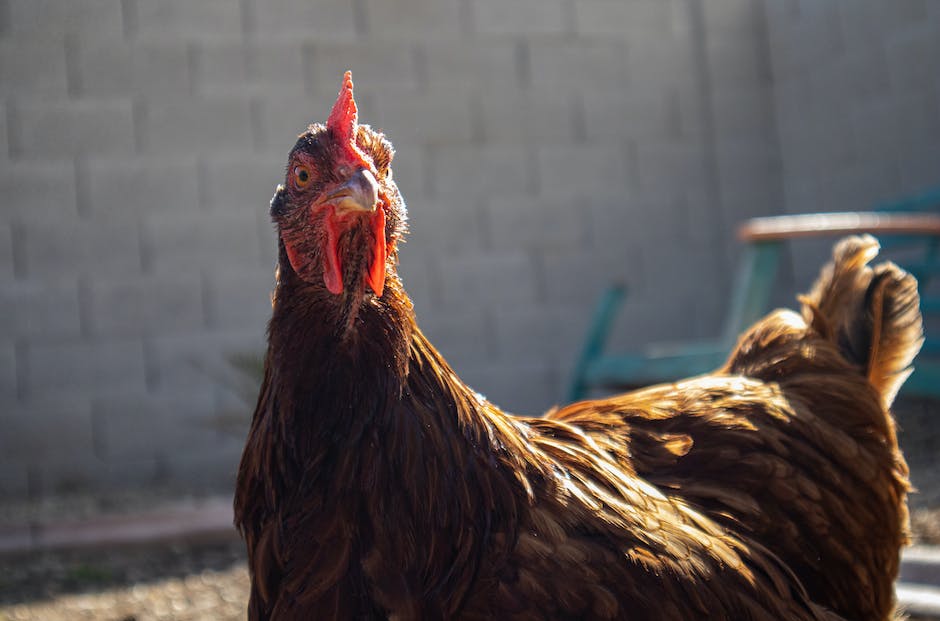
Plymouth Rock
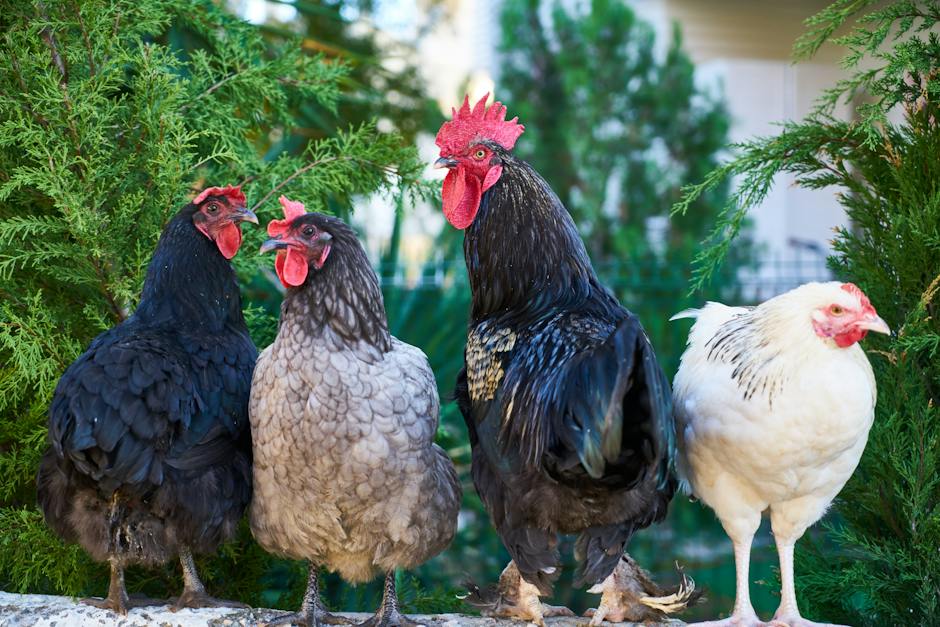
Australorp
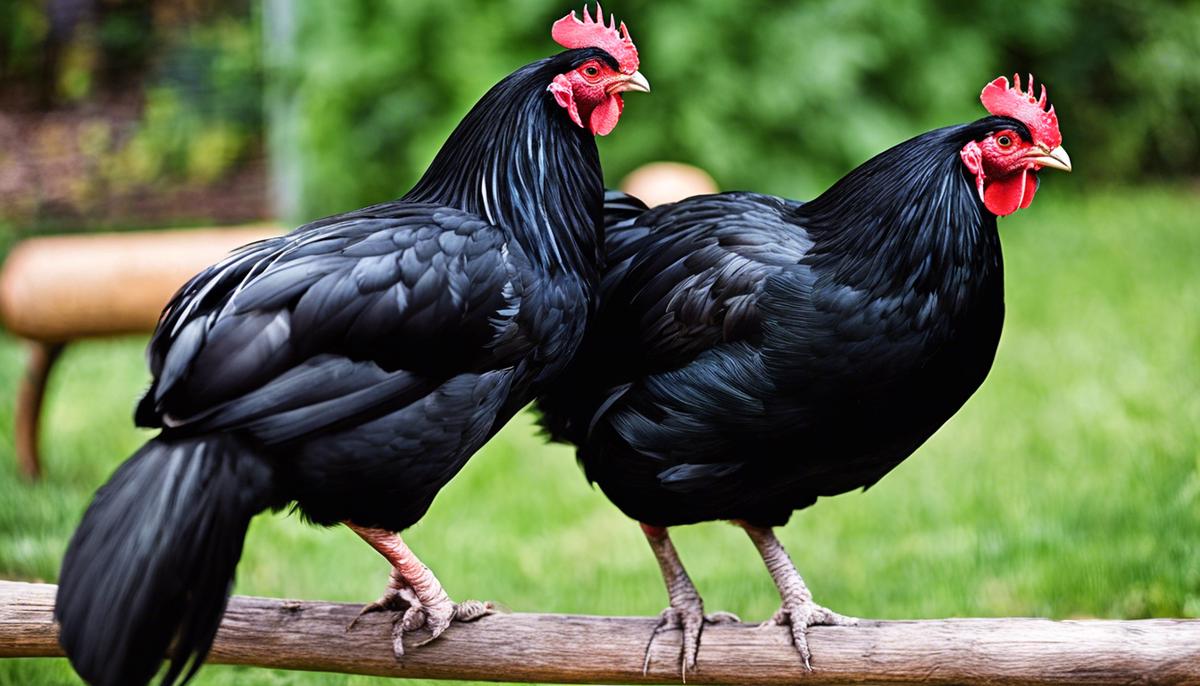
What are the easiest chickens to lay eggs with?
Understanding Egg Production
Unveiling the Mystical Journey of Egg-Laying in Chickens
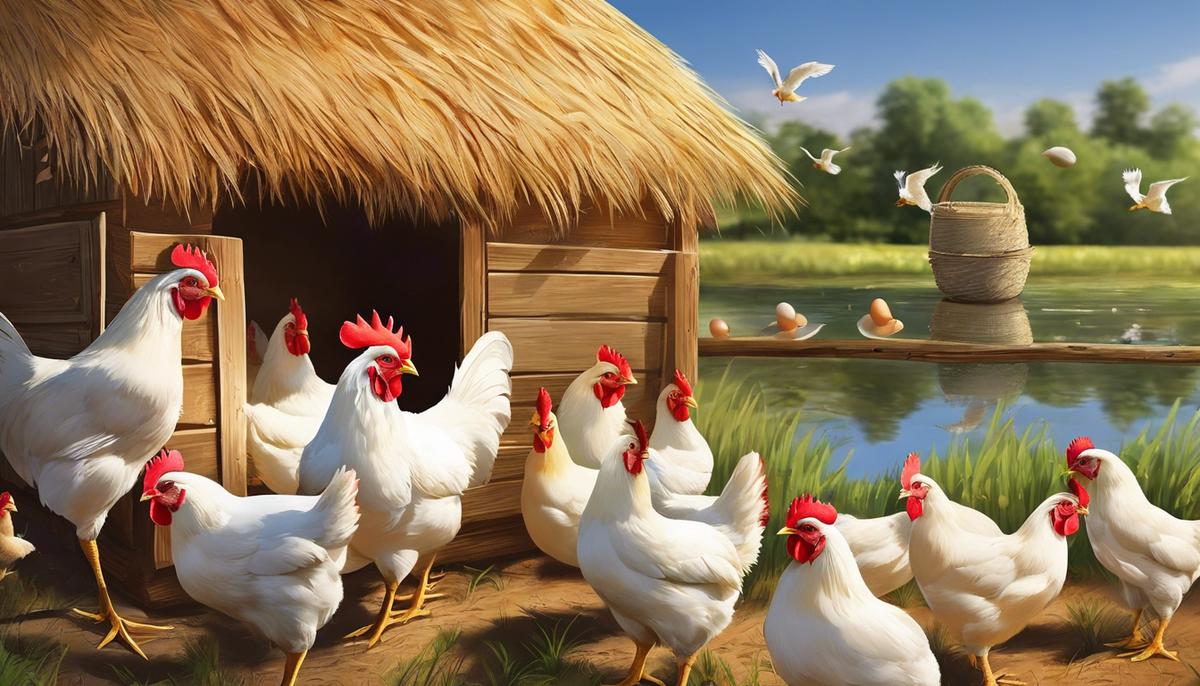
Common chicken breeds for egg-laying
Choosing Chicken Breeds for Prolific Egg Laying
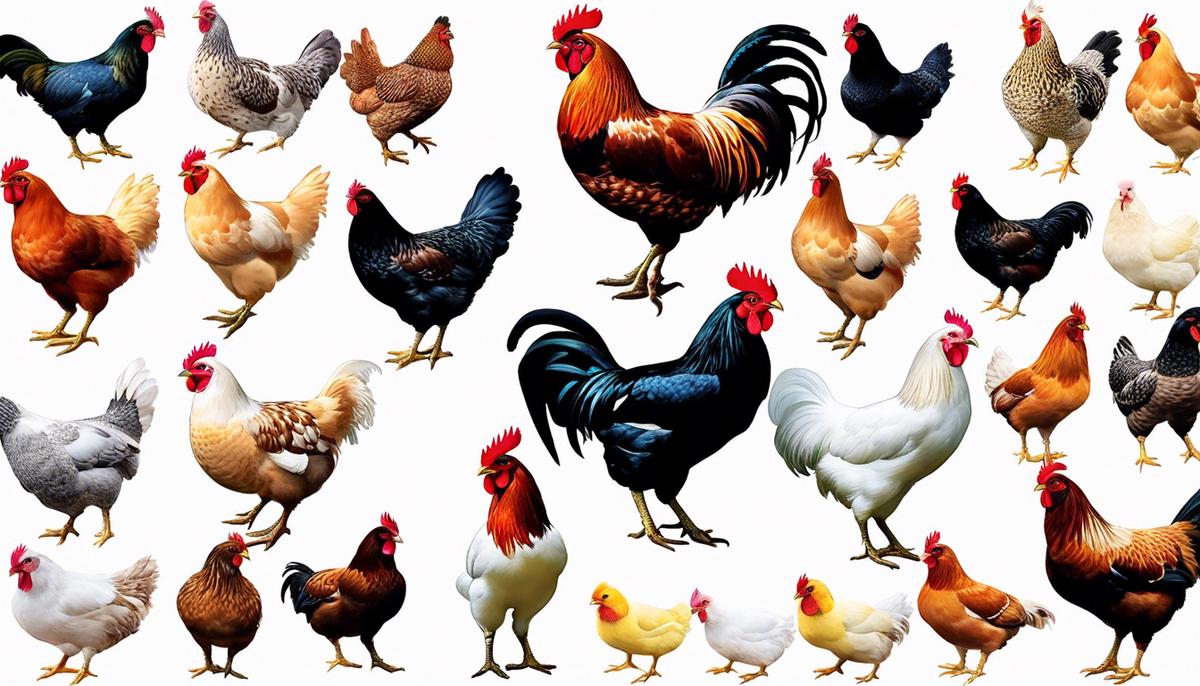
Caring For Egg-Laying Chickens
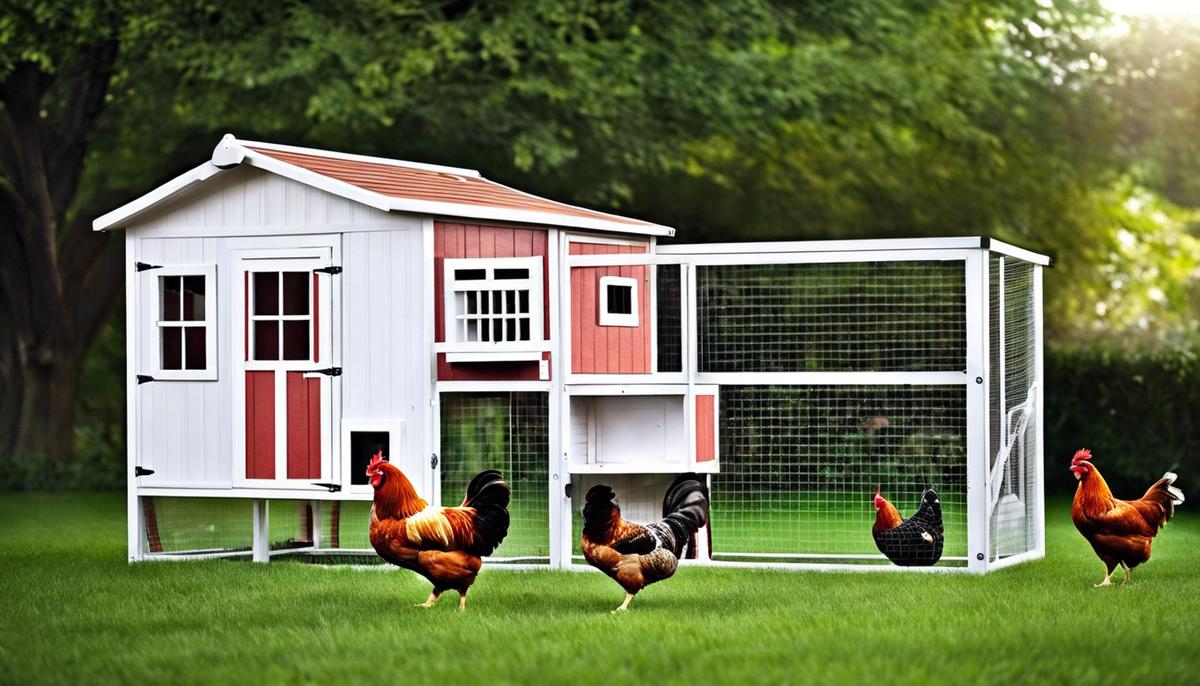
Benefits and Challenges of Raising Egg-Laying Chickens
A Peck Into the Coop: The Joys and Challenges of Raising Egg-laying Chickens at Home
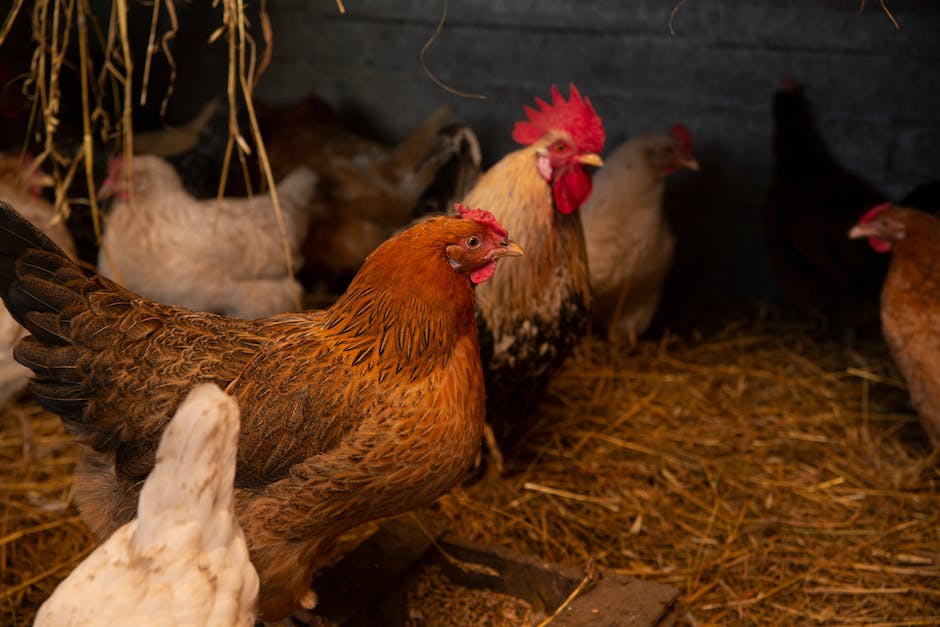
What is the most friendly egg laying chicken?
Understanding Chicken Breeds and Their Egg Laying Capabilities
The A-list Egg Layers: Chicken Breeds Known for Friendliness and Productivity
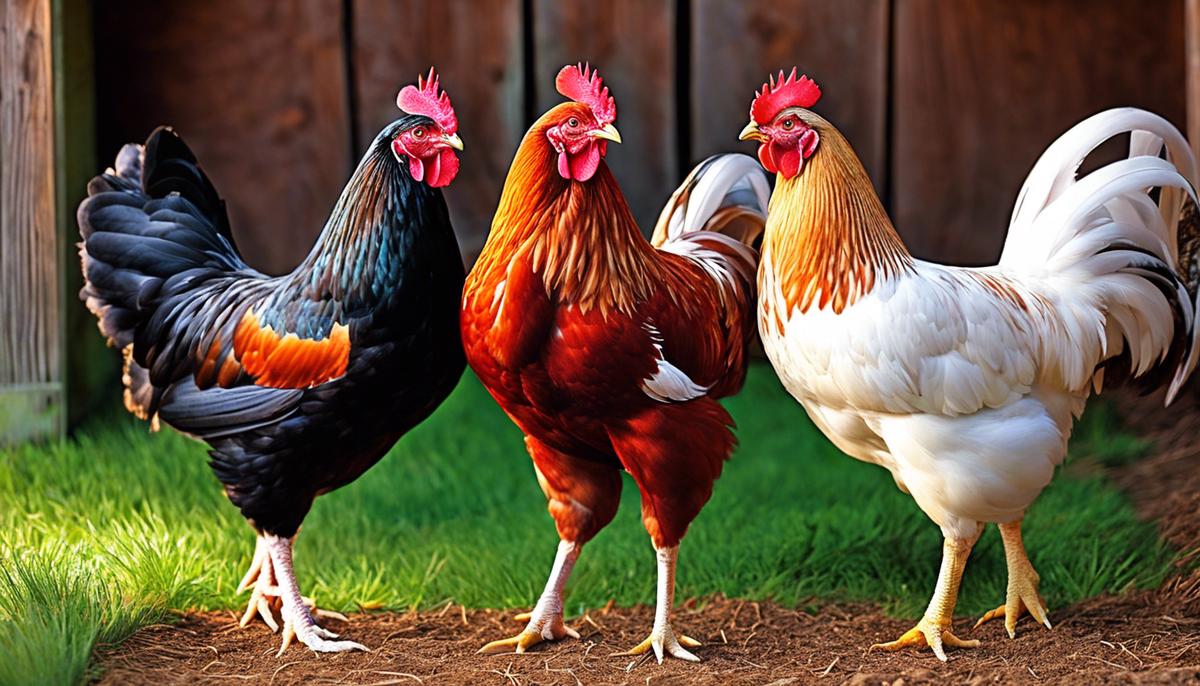
Behavioral Traits and Friendliness of Chickens
Nurturing the Friendliness in Chickens: Understanding Behavioral Traits and Identifying Vital Signs
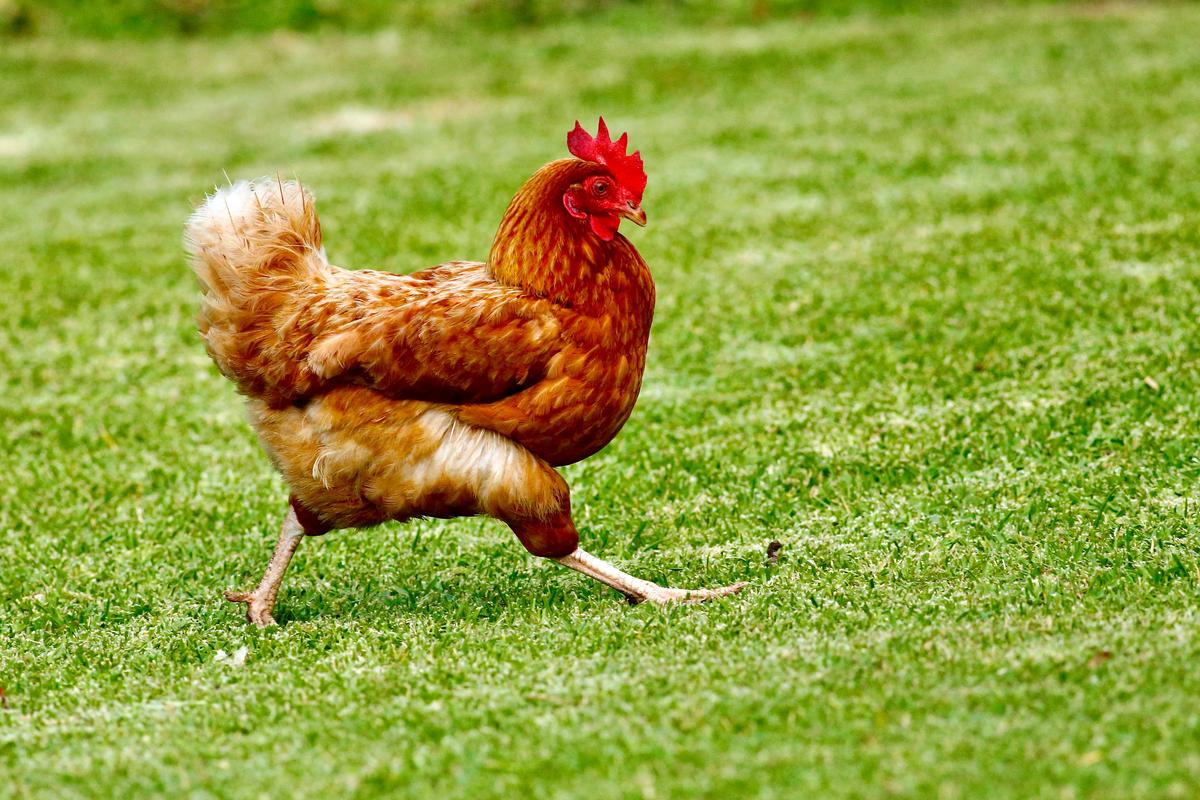
Practical Tips on Raising Friendly Chickens for Eggs
The Road to Cozy Cluckers: Raising Prolific and Personable Chickens
